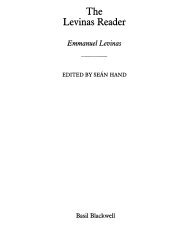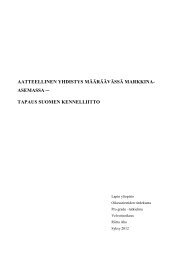Create successful ePaper yourself
Turn your PDF publications into a flip-book with our unique Google optimized e-Paper software.
In this picture of language we find the roots of the following idea: every word has a<br />
meaning. This meaning is correlated with the word. It is the object for which the word<br />
stands” (29). What Wittgenstein is essentially referring to is an understanding of words,<br />
language and meaning via a system that separates the signifier (that sign/symbol which<br />
corresponds to a fixed, immutable thing), from a signified (that concept which embodies<br />
the presence or meaning of the sign).<br />
Preference for this instrumental model of communication that sees language as a means,<br />
which is capable of bringing us towards what might be called fixed “meaning,” is one of<br />
the greatest limitations in the human attempt to establish an authentic understanding of<br />
the dynamics of communication. An acceptance of this perspective on language, spoken<br />
or written, constricts our ability to have an adequate confrontation, or more accurately,<br />
experience of/with media and communication. Schirmacher, in his essay “Media as Life-<br />
World” attests to a concern with media viewed both from the traditional perspective of<br />
structuralism, as well as what might be called “new media” theories:<br />
When speaking or writing about media we still tend to think in terms of channels<br />
to which sender and receiver are connected, a temptingly simple but inadequate<br />
definition. Current media theory proposes the "Gutenberg Galaxy" has run its<br />
course that the electronic media itself has become the "message" and its forms are<br />
to be understood as "extensions of man." Following Marshall McLuhan and<br />
considering the stunning developments of the "new media" theorists such as Neil<br />
Postman, media is analyzed not only as a metaphor and representation of<br />
knowledge, but as an activity, one shaping our social environment and subject to<br />
media ecology. This shift in understanding necessitates a fundamental change in<br />
our relation to media, and in our thinking. Yet although the distinctions between<br />
reality and imagination, truth and fantasy seem to vanish, and the acceptance of<br />
5





